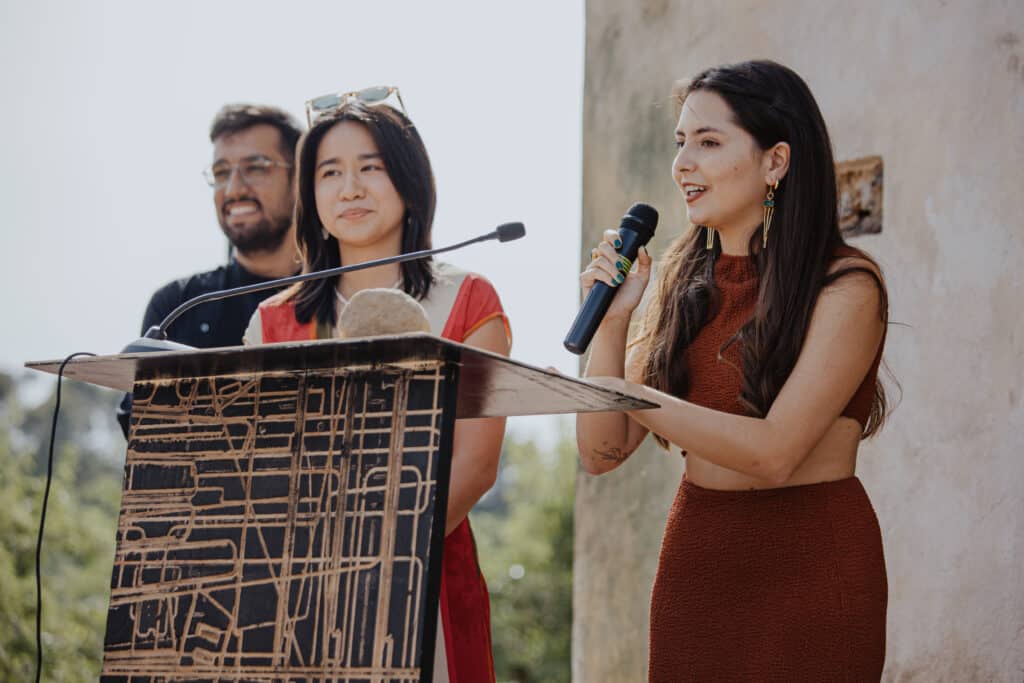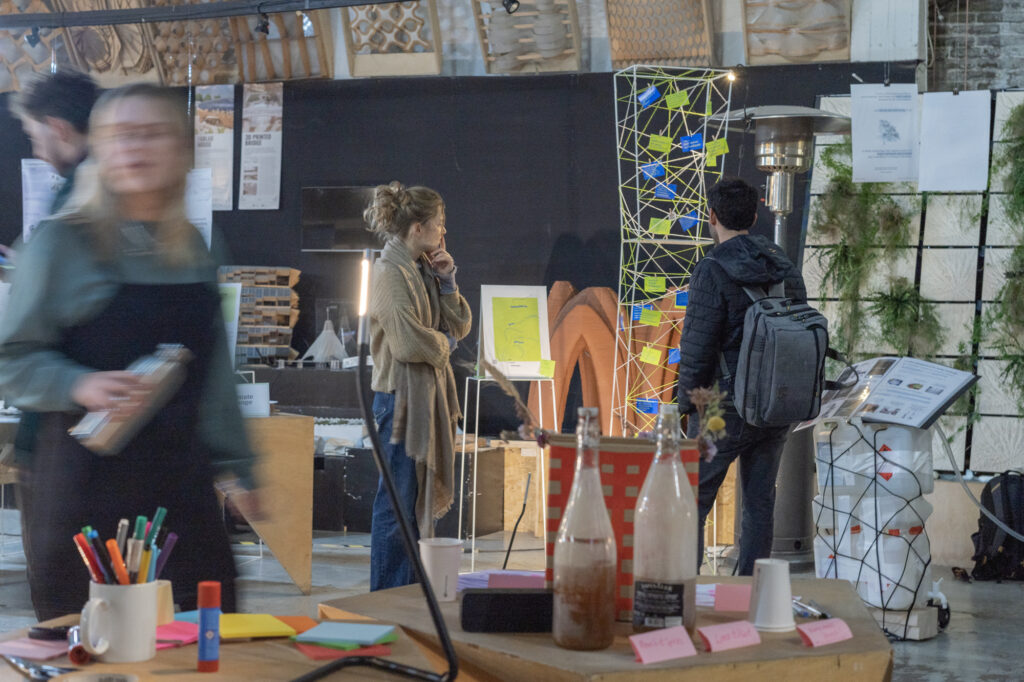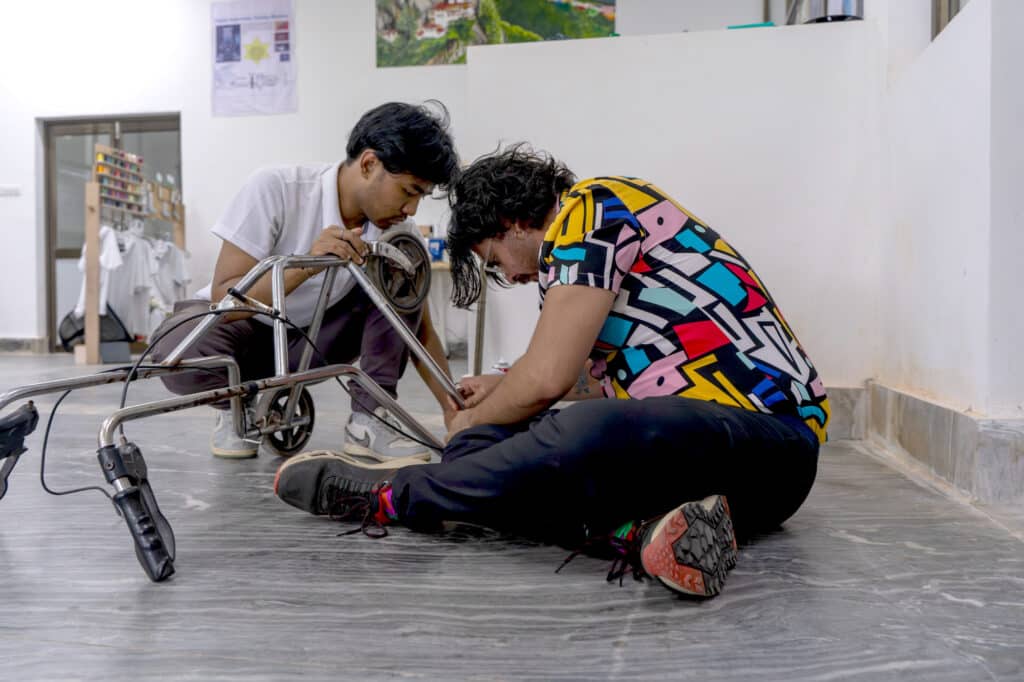The Master in Design for Distributed Innovation (MDDI) is a distributed learning program focused on the intersection of design, technology, ecosystems and communities to improve interspecies wellbeing. It connects a global community of changemakers with local innovators in order to address complex challenges. Combining online and hands-on learning, it supports the development of the social and technical skills needed to develop projects for positive impact in local communities that aim for global transformational change.
INTRODUCTION
The 5th Application Period for the academic year 2024/25 is now open until the 31st of July 2024!
MDDI |
|
| Degree | Master in Design for Distributed Innovation accredited by University of Lleida (UdL) – European Higher Education Area (EHEA) |
| Edition | 3rd edition |
| Credits | 60 ECTS |
| Duration | 10 months. From October 2024 — July 2025 / Part-Time |
| Format | Distributed and Hybrid |
| Language | English |
| Location | Worldwide. Online and in-person in association with participating nodes globally, Fab Labs and Fab Cities |
| Tuition Fee | 12.000 EUR
* Tuition fee includes a non-refundable programme enrollment fee of 2.800€ |
A remote and on-site hybrid program
MDDI presents the next frontier in global impact education. As a distributed program, students will experience a mix of online seminars with in-person mentorships and the production of physical prototypes in their local nodes. The program is structured in three modules of one trimester each, plus a final project implementation. Each module focuses on different levels of the Fab City Full Stack, across three tracks: Ecosystems, Communities and Technology.
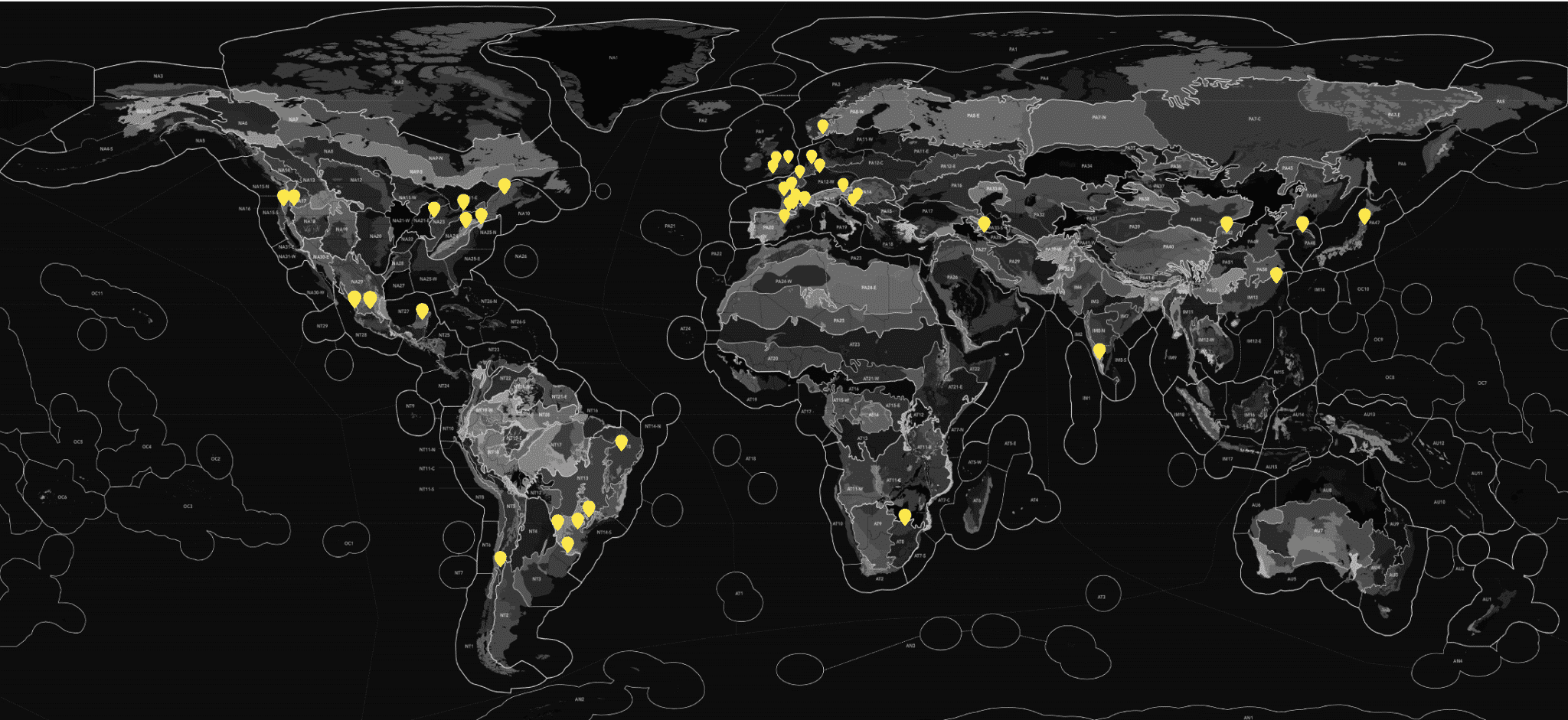
STUDENT PROFILE
As a MDDI candidate, participants might be already working in the public or private sector, academic institutions or, may come from an entrepreneurial background having started their own business related to planetary restoration. The program aims to become a platform to boost and accelerate students’ capabilities to produce change in their own contexts, and to accelerate the transition towards a productive and sustainable model of production and consumption in their communities.
Creative industries & makers
Designers, Makers, Architects, Urbanists and Artists who want to expand their knowledge by incorporating new design methodologies, technological skills and theoretical arguments to deploy in their personal and professional projects sustainably.
Entrepreneurs, social Innovators
Professionals from all areas who wish to transform their ideas into social innovations or start their sustainable entrepreneurship by expanding their technical skills and design methods to become agents of positive change.
Government employees and NGOs
Professionals who are already making changes from inside in public services or non-governmental-organisations and want to accelerate the impact of policy by adopting a sustainable innovation culture.
PROFESSIONAL OPPORTUNITIES
The program offers innovators and changemakers the opportunity to address global challenges in their working and living contexts to enable local transformation, by learning from and adapting global knowledge. MDDI graduates will have the possibility to integrate the knowledge acquired in the program in their working environments, or expand their research agenda after the program. At the same time, graduates with an existing business or initiative linked to the purpose of the program will have the opportunity to reinforce and scale up their reach, and incorporate new knowledge in their current mission. An MDDI graduate might change or develop a new department within their organization, or find work as Head of Innovation, Director of Strategic Design, Head of Research and Development, CEO of their own startup, or lead transformation projects in public and civil organizations.
Admission Requirements
Bachelor or higher degree in Industrial Design, Product Design, Architecture and Urban Design, Graphic Design, Interaction Design, Computer Science, Engineering (Mechanical, Chemical, Product, Material), Sociology, Anthropology, Economy, and other related professions.
PROGRAM STRUCTURE
As a distributed program, MDDI students will experience a mix of online seminars with in-person mentorships and the production of physical prototypes in their local nodes. The program is structured in three modules of one trimester each, plus a final project implementation during one month. Each module focuses on a pair of levels of the Fab City Full Stack, which are developed in three tracks: Ecosystems, Communities and Technology.
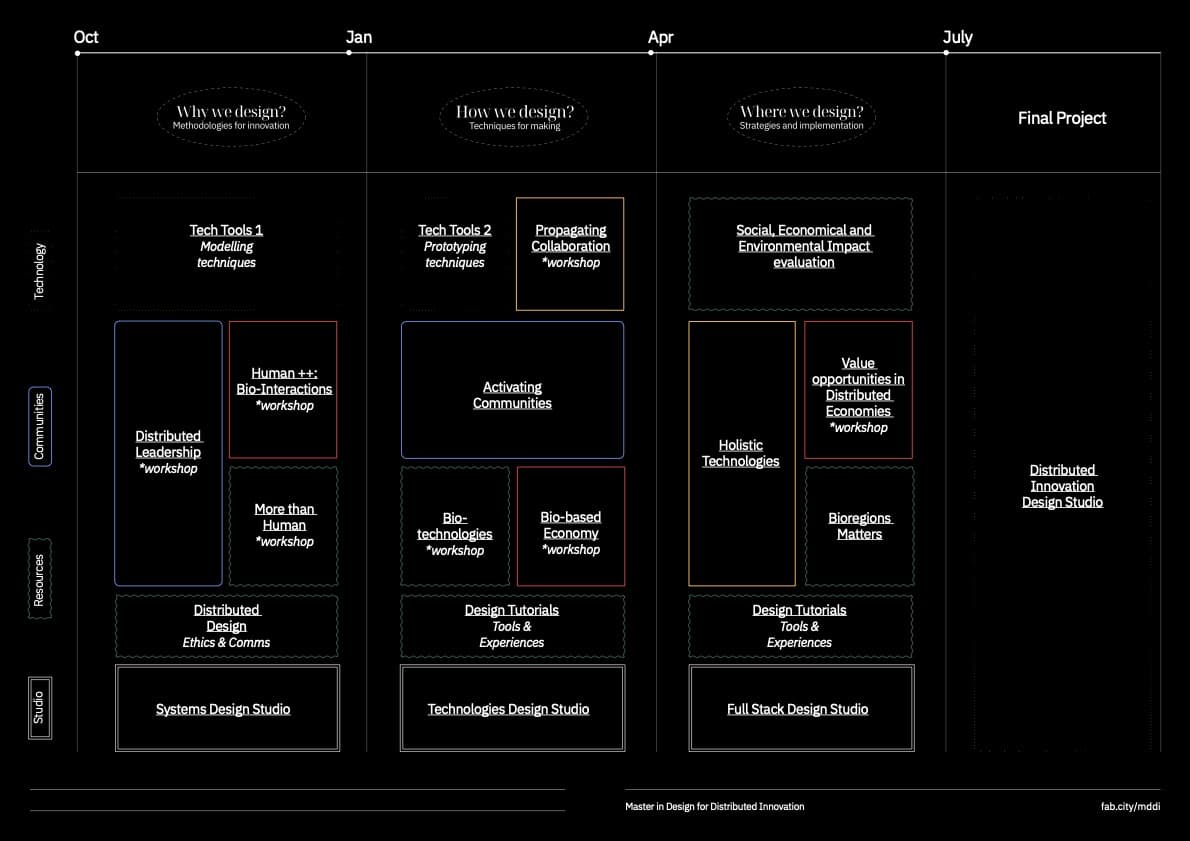
The aim of this module is to establish a foundational layer of understanding the implications of design in its collaboration with communities, human and nonhuman agents, by giving students methodological tools to develop valuable and meaningful scalable systems. With a focus on the development of new learning skills for designing the future and how to enable impact-based incubations at local scales, based on distributed design, collaboration, biomass economy and digital tools.
This module focuses on developing technical skills to develop sustainable and innovative solutions based on the reconfiguration of technology, social dynamics and resources. Focusing on developing shared urban and territorial strategies, cultivating networks of communities and cities, based on bio-technologies, bio and digital fabrication, bio interactions and blockchain.
In this final module, students will be introduced to different but integrated strategies of applying, developing and leading innovative projects in an economic, social, and environmental regenerative manner, achieving a bioregional impact. By developing skills related to impact evaluation, integrative technologies, multiscale layering and horizontal leadership.
SEMINARS AND CONTENTS:
Module 1
October – December
The aim of this module is to establish a foundational layer of understanding the implications of design in its collaboration with communities, human and nonhuman agents, by giving students methodological tools to develop scalable systems.
Tech tools 1
This introductory seminar will give students the required basic skills to 3d design modeling, basic coding, and data representation skills.
Distributed Leadership
Designing and applying distributed innovations requires a new leadership archetype based on a humanistic approach that can horizontally integrate all actors and lead behavioral changes in their current environments with autonomy, conviction, and team building.
Human ++: Bio-Interactions
This seminar will focus on the measurement and exploration of biological interactions between humans, objects, spaces, and infrastructures, giving students a novel perspective to understand our relationship with our natural and artificial environment through biology.
More-than-Human
This seminar will focus on four aspects of design: Material driven multi-interfacing opportunities for complex systems, biodesign landscapes: a brief overview, from human-centric to nature-centric ecosystemic do-ing & emotive design, vibrant matter and moving away from universality.
Distributed Design
Productive based design methodologies are the basis of the actual production model that promotes the black-boxing of products and services, distances designs, producers, users and ecosystems. Distributed Design offers a set of tools to design systems in an inclusive, collaborative, sustainable and democratic way.
System Design Studio
In this studio, students will design a system in a predefined environment, focusing on the replication, evolution, and scaling of the solution, understood as an intervention.
Module 2
January – March
This module focuses on developing technical skills to develop sustainable and innovative technologies based on digital and bio technologies that can impact local communities in the scale of neighborhoods and cities.
Tech tools 2
This local seminar will follow a predesigned methodology to introduce students to digital fabrication techniques and tools like 3d printing, milling, and laser cutting.
Bio-technologies
The course proposes an interdisciplinary methodology that combines Design Thinking with the observation of nature and the understanding of biotechnology. During the Biodesign process, students will have the possibility of formulating projects that incorporate biotechnologies to solve challenges related to the Sustainable Development Goals. Through practical exercises around observation and prototyping, expert guests and the formulation of a final project, an application is designed taking into account scientific articles, biotechnologies, living organisms, natural and ecological systems, among others to solve a specific problem.
Bio-based Economy
The seminar will focus on the foundational concepts for developing regenerative materials for a circular economy. The majority of time will be spent doing practical making and applied research, with the goal of co-creating resources for further use in the regenerative materials community. Objectives include understanding the principles of life-friendly chemistry and applying them to materials development, and creating tools and methodologies for an ecoregional approach to materials sourcing. Evaluation will be based on developing a prototype of a new material, a written report about a current leader in regenerative materials, and a final project developing and applying a methodology for ecoregional sourcing.
Propagating Collaboration
Facing a world dominated by the culture of competition, divided by markets, politics, and borders; distanced by pending gaps in education, health, and incomes; and disconnected from others perspectives. This seminar promotes the culture of collaborative creativity, allowing participants to integrate ideas and capabilities to co-create innovative solutions with high global impact.
Activating Communities
This seminar will have an intercultural approach of sharing knowledge, methodologies, and experiences from diverse global leaders that in different contexts are taking care of the planet and their social and natural ecosystems. Providing students with different perspectives, motivations, and methods to approach their own communities.
Technologies Design Studio
This studio will focus on the development of a functional technological intervention in a local community, with the capacity to establish a relationship between nature, social dynamics.
Module 3
April – June
The aim of this module is to establish a foundational layer of understanding the implications of design in its collaboration with communities, human and nonhuman agents, by giving students methodological tools to develop scalable systems.
Holistic Technologies
We spend our lives interacting with objects and interfaces whose underlying technology we hardly understand, not merely due to their complexity but also because they were intended to be closed by design. Through the idea of hacking, we will explore the internal components building everyday objects, from coffee machines to wi-fi networks, while learning the principles of open software and hardware tools to change the way they work and interface with the world.
Social, economical and environmental impact evaluation
The purpose of this course is to allow the students to quantify the causal effect of social and environmental interventions by giving them a basic understanding of impact evaluation methods. The course guides the student on the step by step process of understanding the pathways of change, conceptualizing an evaluation, the different methodologies for conducting impact evaluation and choosing the most appropriate methodology given the circumstances and each method’s weaknesses and strengths.
Bio-regions Matters
In this Seminar, we will raise the importance of situating systemic transitions into “local” cultures by diving into various scales (from neighborhoods, cities, regions) and by practicing systemic thinking for regeneration and proximity. We will particularly emphasize the role of labs as an interface for citizen engagement, co-creation and public engagement in territories and explore case studies from different bioregions highlighting intersections between urban-rural, coast- mountain, emotional-cognitive.
Value Opportunities in Distributed Ecosystems
This seminar will give students a wide perspective and deep understanding of how distributed technologies support new economic models, impacting the way we consume, produce, validate and distribute information and goods.
Full-Stack Design Studio
This studio focuses on the integration of the multi-layers of the Fab City Full Stack of a functional technological design system that can promote a new and positive change in its contexts integrating social, technological, and natural environments.
Final Project
July
Final Project Implementation
During the last month, students have to develop and implement a final project in collaboration with its nodes ecosystem. The projects should be a positive solution that integrates the local ecosystem and community through technology, service or model.
MDDI Ethical Principles
Transformative
Focused on supporting and developing local leadership to enable transformation at the local scale, while contributing to and learning from -and with- global networks.
Planet Centered
Using design, technology and innovation to address environmental and social challenges focusing on the stability of the planet.
Distributed
Sharing global knowledge and applying it locally. Supported by the global Fab Lab Network and associated cities of Fab City Global Initiative. Realized through coordinated nodes hosting groups of students and tutors.
Inclusive and Just
Recognising our global differences and learning from them. Promoting respect to diverse cultures, backgrounds, and worldviews.
Collaborative
Connecting diverse actors from local ecosystems by transferring capacities and knowledge, and sharing common objectives globally.
FACULTY:
MDDI program has been designed by researchers, practitioners and thought-leaders from Fab City, Fab Lab Barcelona, IAAC and the global Fab Lab Network ecosystems, gathering a unique and internationally recognised team.
Directors.
Tomás Vivanco
Architect, Master in Advanced Architecture – IAAC/ PhD(c) Digital Futures, Tongji University/ Professor School of Design, Pontifical Catholic University of Chile
Tomás Diez
Fab City Executive Director, MDEF Co-Director, IAAC Strategic Advisor and Board Member
Faculty.
Kate Armstrong. Head of Programing in Interspecies Internet, Executive board at Fab City
Guillem Camprodon. Fab Lab Barcelona Executive Director
Ronald Sistek. CEO in CO Consulting, Organizational Regeneration.
Eduardo Chamorro. Fab Lab Barcelona Digital Fabrication Expert.
Elizabeth Corbin. Materiom co-founder.
Dr. Mara Balestrini. Digital Transformation Specialist.
Thomas Duggan. Artist and director of Thomas Duggan Studio.
Benito Juarez. Architect & Fabber. Co-founder of the Latin American Fab Labs Network
Dr. Elizabeth Henaff. Biologist, Assistant Professor NYU
Dr. Paulo Cruz. Strategic Management, Weflow Global
Santiago Fuentemilla. Fab Lab Barcelona Future Learning Lead
Flavia Feliz. Public Relations, Weflow Global
Adam Burns. Thinker & Doer, Dyne.org Foundation
Pilar Bolumburu. Materials Researcher, Materiom
Dr. Alysia Garmulewicz. Materiom co-founder
Dr. Giovanna Danies. Biologist and Microbiologist, Associate Professor UAndes, Colombia
Liza Valença. ESG, Impact Evaluation and Advocacy, Weflow Global
Mihaela Tudorache. Information Technology Project Manager, Dyne.org Foundation
Stefano Bocconi. Software engineer, Dyne.org Foundation
Charlene Smith. Research & Application, Materiom
Kate Raworth. Economist, Doughnut Economics
PARTNER ENTITIES:
FAB CITY FOUNDATION
Founded in 2014 as a spinoff of the Global Fab Lab Network and Fab Lab Barcelona, Fab City Foundation coordinates a global network of 41 cities that pursue a shift away from the linear industrial paradigm of linear production and consumption of our cities, based on the import of products that generates trash (PITO: Product-in Trash-out), by enabling the return of manufacture to cities supported by a circular and local productive model, based on digital technologies and information (DIDO: Data-in Data-out). Fab City is expanding the impact of the Fab Lab Global Network of more than 2,500 Fab Labs distributed in the five continents supporting this change in the scale of production, by providing the physical infrastructure to produce locally (almost) everything. At the same time, by connecting highly technical trained people with communities for knowledge transfer and prototyping capacities.
FAB LAB BARCELONA- INSTITUTE FOR ADVANCED ARCHITECTURE OF CATALONIA
The first Fab Lab funded in the European Union in 2007, is situated inside the Institute for Advanced Architecture of Catalonia (IAAC). Fab Lab Barcelona is a founding member and one of the first locations of the global distributed education program, Fab Academy. As part of the transition into Industry 4.0 and leading the Fab City initiative, Fab Lab Barcelona focuses on the human-scale and the everyday experience; identifying opportunities in rising trends across seven strategic areas of expertise including Distributed Design, Future Learning,
IAAC – INSTITUTE FOR ADVANCED ARCHITECTURE OF CATALONIA
The Institute for Advanced Architecture of Catalonia (IAAC) is a centre for research, education, production and outreach, with the mission of envisioning the future habitat of our society and building it in the present. IAAC follows the digital revolution at all scales (from bits to geography, from micro-controllers to cities, from materials to the territory) to expand the boundaries of architecture and design and meet the challenges faced by humanity. IAAC is an experimental and experiential centre where one learns by doing, through a test methodology that promotes real solutions. IAAC is an open, independent and radical non-profit foundation, with 20 years of activity; inspired by the values of Barcelona, the capital of architecture and design, where urbanism was invented and where local high quality and innovation-oriented research is connected to an international network of excellence in technology, architecture and society fields.
NODES, FAB LABS & MAKER SPACES
The in-person learning experiences are imparted across the world in local nodes, Fab Labs or maker spaces, which become the physical spaces where students gather, meet their local instructors, join online classes together, prototype their ideas and develop their weekly assignments and projects.
+ Contact the Master’s coordinator to check what are the current nodes.
+ Check if there’s a Fab Lab in your city at https://www.fablabs.io/
+ If your city or closest Fab Lab is not on the list, let us know where you live so we can support you in finding the nearest maker space.
FAB CITY GLOBAL INITIATIVE
MDDI is designed using the Fab City Full Stack, a multiscale approach outlined by the Fab City global initiative. This layered approach forms the basis of the program, framing the methodological approach to conceptualizing transformational change.
+ Check more about this at https://fab.city/resources/mddi-methodology/
FAQs
What is Distributed Education?
Distributed Education is a blended methodology that mixes online and in-person education formats that use physically distributed and digitally interconnected global infrastructure nodes, like Fab Labs, that become classrooms. Students practice synchronously and asynchronously, creating a global and distributed campus.Whilst the approach is similar to distance education, it takes the concept a step further, distributing the development and circulation of content between the nodes as well.
What if there is no node in my city?
You can fill in the form and let us know where you are based. The MDDI coordination team will get in touch with you to see if it’s possible to connect you to a node or Fab Lab close to you. If for any reason we can’t connect your city to the program, we’ll endeavour to help you to join your closest existing node.
How will the local knowledge of my community contribute to the program?
Each MDDI node offers students access to the local community and networks to deploy their projects in a bottom-up approach. This is important in reaching the goals of the Fab City global initiative. It all starts with building ecosystems within cities and developing sustainable initiatives that will shape the new global production paradigm.
Do I need to have ‘Fab Lab’ skills to apply?
We don’t require any specific technical skills. We look for diverse student profiles, with different backgrounds and expertise. MDDI is designed for everyone interested in design, sustainability, technologies, ecologies and cities.
Do I need to have a project to apply?
Because our student profile includes different backgrounds and disciplines, every application will be evaluated under its individual merits. To apply you only need a professional diploma, a letter of interest and a portfolio or a project-based CV.


